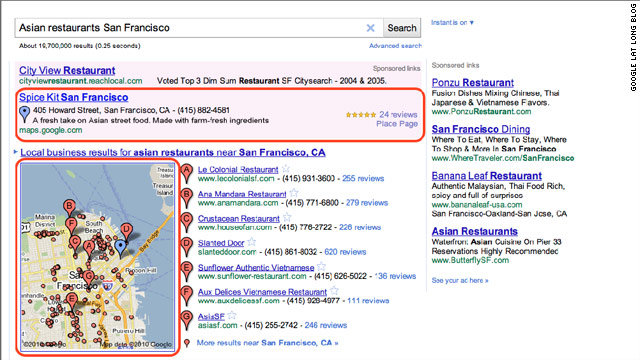Google gives local businesses advertising boost

- Currently available in San Francisco, Houston and Chicago right now
- Business owners can create Boost ads from within their Google Places
- Mashable sees this product as a preemptive strike against Facebook Places advertising
(Masahable) -- Google has just launched Boost, a location-based ad product for local businesses.
Built on Google Places, Boost beta is available in San Francisco, Houston and Chicago right now and will roll out to more cities soon.
Boost ads show up when users search for local businesses; they appear in the "sponsored links" section of Google's() web search and Google Maps(), as well. Ads will appear when the right combination of vertical keyword (e.g., "restaurants") and location keyword (e.g., "San Francisco") is met.
The ads can contain basic location information, such as the address, business name and phone number, as well as more consumer-focused tidbits, including a star ratings, number of reviews received and a special Maps marker.
Business owners can create Boost ads from within their Google Places account. Initial setup is simple, and campaign management is automatic; all the business owner needs to do is set a budget, and Google's advertising algorithm takes care of the details of placement and frequency.
We see this product as a preemptive strike against Facebook Places advertising. (To date, Facebook() has only announced cursory guidelines for Places use by businesses; no ads are yet being sold for this product.)
These two companies are in a tight battle for ad dollars, and Facebook has been able to gain a competitive advantage by delivering hyper-targeted, highly relevant ads based on user-supplied information. With more location-based information flowing into the network via Facebook Places, Facebook is also poised to lead location-based advertising.
However, Google's advantage here is that they're capturing not only highly qualified but also actively interested consumers. On Facebook, the user's ad viewing may be much more passive and less likely to end in a purchase or other desired action.
Local and location-based information has been a focus at Google lately. The company announced it would focus on delivering more geo-specific search results earlier this month, right around the time it named Marissa Mayer, thenVP of search product, its location and local services chief.
© 2013 MASHABLE.com. All rights reserved.

